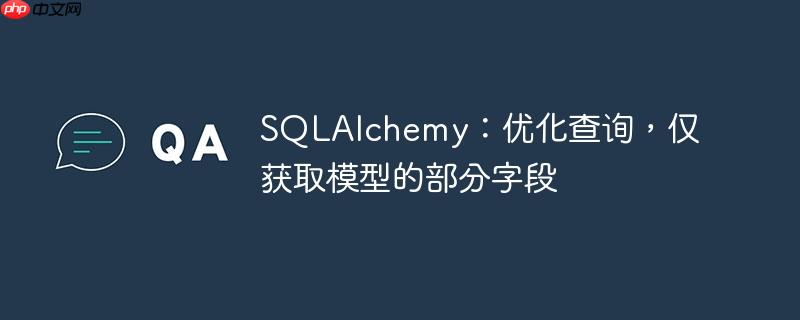
本文旨在解决 SQLAlchemy 中查询数据库时,如何只获取模型的部分字段,避免加载不必要的数据,从而优化查询性能的问题。通过对比不同的查询方式,深入探讨 load_only 选项的使用,并强调缓存可能带来的影响,帮助开发者更高效地使用 SQLAlchemy。
在使用 SQLAlchemy 进行数据库查询时,有时我们只需要获取表中的部分列,而不是全部列。这可以减少数据传输量,提高查询效率。 SQLAlchemy 提供了多种方法来实现这个目标。
最直接的方法是在 select 语句中指定需要查询的列。
from sqlalchemy import select from sqlalchemy.orm import Session # 假设 PostSQL 是你的模型类 # query = select(PostSQL.id, PostSQL.title) # result = session.execute(query) # posts = result.all() # print(posts) # Output: [(1, 'hello'), (2, 'hello')]
这种方法返回的结果是一个元组的列表,每个元组包含所选列的值。这种方式简单直接,避免了创建完整的模型对象,适用于只需要部分字段的场景。
示例
from sqlalchemy import create_engine, Column, Integer, String
from sqlalchemy.orm import sessionmaker
from sqlalchemy.ext.declarative import declarative_base
Base = declarative_base()
class PostSQL(Base):
__tablename__ = 'posts'
id = Column(Integer, primary_key=True)
title = Column(String)
content = Column(String)
# 假设还有其他列,例如 author, created_at, updated_at
engine = create_engine('sqlite:///:memory:') # 使用内存数据库进行演示
Base.metadata.create_all(engine)
Session = sessionmaker(bind=engine)
session = Session()
# 插入一些示例数据
post1 = PostSQL(title='Hello World', content='This is the first post.')
post2 = PostSQL(title='Another Post', content='This is the second post.')
session.add_all([post1, post2])
session.commit()
# 查询 id 和 title 列
from sqlalchemy import select
query = select(PostSQL.id, PostSQL.title)
result = session.execute(query)
posts = result.all()
print(posts) # Output: [(1, 'Hello World'), (2, 'Another Post')]
session.close()另一种方法是使用 load_only 选项。这种方法会返回完整的模型对象,但只从数据库中加载指定的列。
from sqlalchemy.orm import load_only # query = select(PostSQL).options(load_only(PostSQL.id, PostSQL.title)) # result = session.execute(query) # posts = result.scalars().all() # print(posts) # Output: [<PostSQL object at ...>, <PostSQL object at ...>] # for post in posts: # print(post.id, post.title)
注意事项
示例
from sqlalchemy import create_engine, Column, Integer, String
from sqlalchemy.orm import sessionmaker, load_only
from sqlalchemy.ext.declarative import declarative_base
Base = declarative_base()
class PostSQL(Base):
__tablename__ = 'posts'
id = Column(Integer, primary_key=True)
title = Column(String)
content = Column(String)
# 假设还有其他列,例如 author, created_at, updated_at
engine = create_engine('sqlite:///:memory:') # 使用内存数据库进行演示
Base.metadata.create_all(engine)
Session = sessionmaker(bind=engine)
session = Session()
# 插入一些示例数据
post1 = PostSQL(title='Hello World', content='This is the first post.')
post2 = PostSQL(title='Another Post', content='This is the second post.')
session.add_all([post1, post2])
session.commit()
# 使用 load_only 查询 id 和 title 列
from sqlalchemy import select
query = select(PostSQL).options(load_only(PostSQL.id, PostSQL.title))
result = session.execute(query)
posts = result.scalars().all()
for post in posts:
print(f"Post ID: {post.id}, Title: {post.title}")
# 尝试访问 post.content 会导致延迟加载或错误,取决于配置
# print(post.content)
session.close()通过选择合适的方法,可以有效地优化 SQLAlchemy 的查询性能,提高应用程序的效率。
以上就是SQLAlchemy:优化查询,仅获取模型的部分字段的详细内容,更多请关注php中文网其它相关文章!

每个人都需要一台速度更快、更稳定的 PC。随着时间的推移,垃圾文件、旧注册表数据和不必要的后台进程会占用资源并降低性能。幸运的是,许多工具可以让 Windows 保持平稳运行。

Copyright 2014-2025 https://www.php.cn/ All Rights Reserved | php.cn | 湘ICP备2023035733号